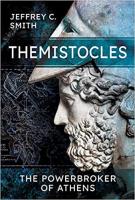
Pen & Sword (2021) h/b 284pp £25 (ISBN 9781526790453)
S. teaches humanities and ancient history at Stony Brook School—a long established boarding school in Long Island, New York. This appears to be his first publication.
The book is a traditional biography with a strict chronological structure. It is written for a non-specialist audience and is supported by a concise and clear glossary of the technical terms referred to and some very brief but informative biographies of the main players. There are also 4 maps and eight pages of assorted illustrations. The picture drawn of Themistocles is that he was prescient in his anticipation of challenges ahead (Persia followed by Sparta); farsighted (and mainly successful) in his planning for the resolution of those challenges (founding a navy and establishing the Delian league): devious in the execution of those plans (Salamis, the use of funds); and reliant on populist support while constantly in tension with the more aristocratic elements in Greek society (Cimon, Xanthippus). S. concludes that, with the exception of Thucydides, Themistocles has probably been underestimated by historians.
As Roy Gibson commented recently in his biography of Pliny the Younger, current biographers of classical personalities who wish to write a modern style biography start from the disadvantage that their sources, often thin, incomplete and unreliable, do not comment on the interior lives of their subjects, preferring to place their careers within the context of the wider canvas that the authors are seeking to elucidate. It is difficult to fill out these sources to 300 pages in a modern biography without some form of padding.
As can be seen from the relatively short notes section, S. has relied almost exclusively on the classical sources for his narrative. He has been scrupulous not to attempt to give Themistocles a voice, other than that already attributed to him by the sources—which he illustrates frequently. He has also included competing source material, often without seeking to adjudicate on the discrepancies. He regularly repeats the terms in which the sources standardly characterise the events they describe—bribery, treachery, medize, populism, etc.—usually without inquiry. Thus his significant fleshing out of the narratives from the sources is restricted to relatively routine elucidations.
This technique works well in the chapters on the military campaigns, although the reader may well remain confused about Themistocles’ motivation at Salamis. It works less well in the political chapters where the absence of the ‘why’ in relation to the ‘what’ is inevitably more perplexing. Greater use of secondary sources in describing the political context (both internal to Athens and abroad) might have helped—the mechanics of the ostracism system are well described but the workings of a deme, the boulê or patronage hardly at all.
In his introduction S. seeks to introduce the reader to the Greek concept of aretê, where he likens Themistocles to the Homeric Odysseus, and to explain why characteristics, which to a modern audience might seem far from admirable, resonated well with Themistocles’ contemporaries. His final chapter on ‘the legacy of Themistocles’ is masterfully concise and persuasive.
The style of the book is crisp, lucid and at times, almost conversational. It should appeal to any non-specialist reader who is generally interested in the classical world and provides an excellent introduction to a man who, after Alcibiades, is probably the most intriguing and elusive citizen of ancient Athens.
Roger Barnes
